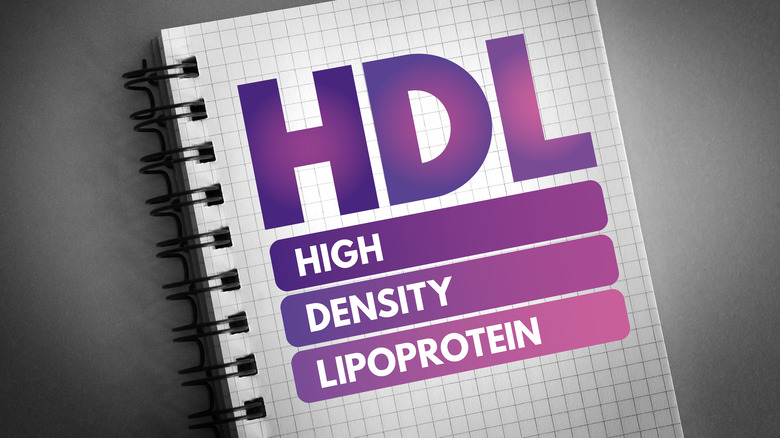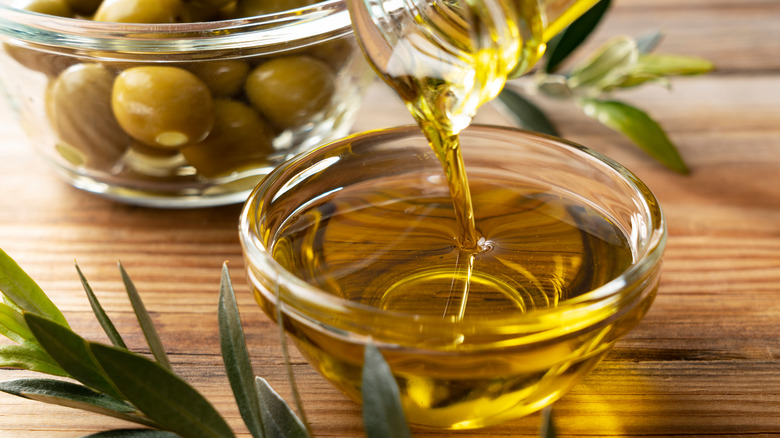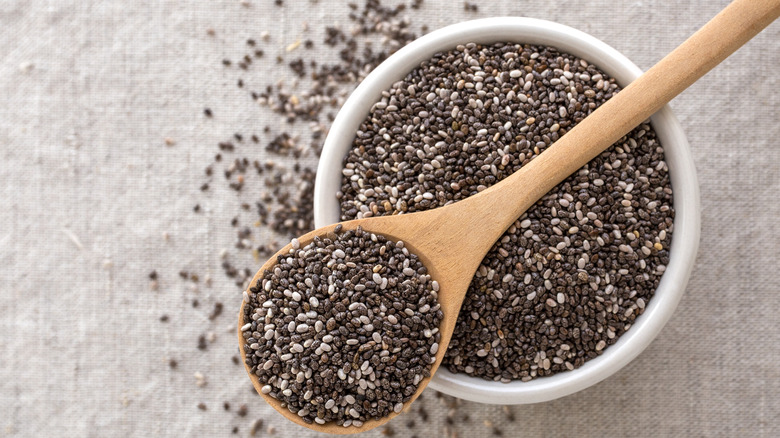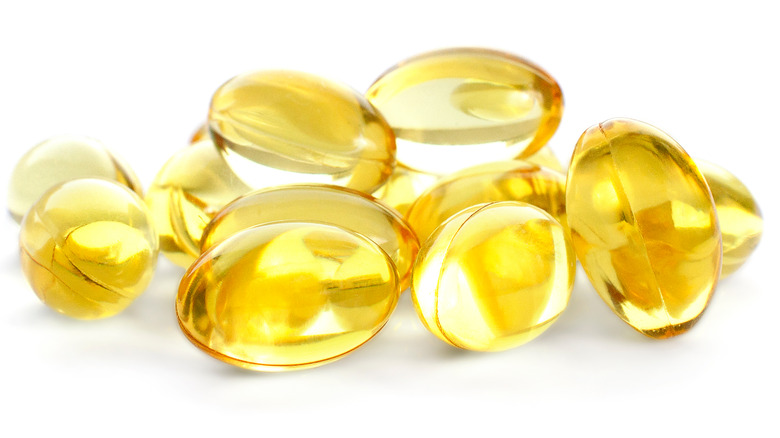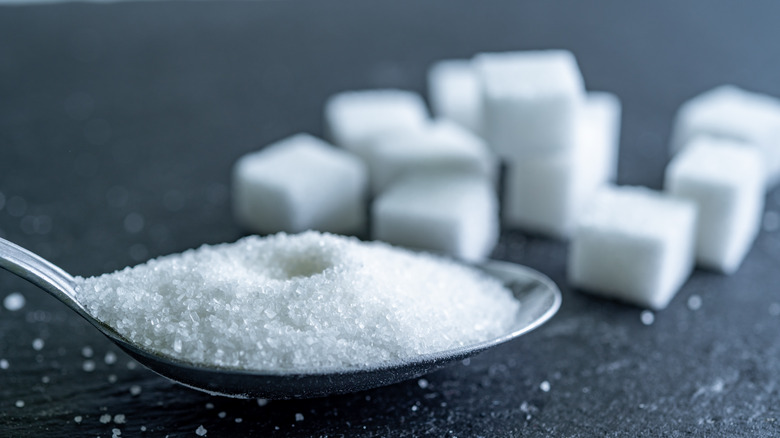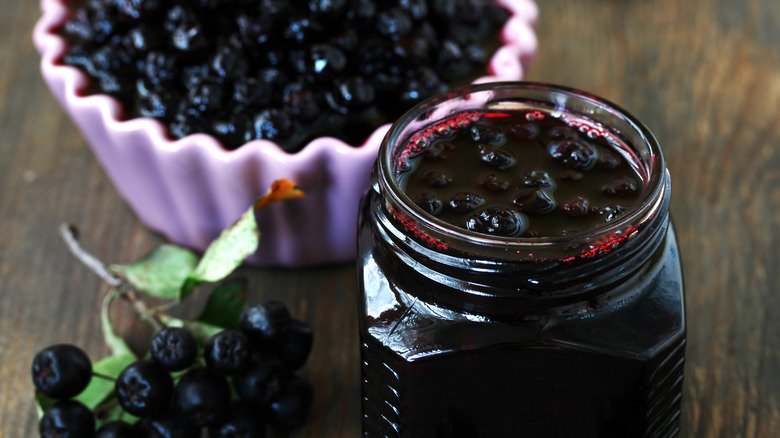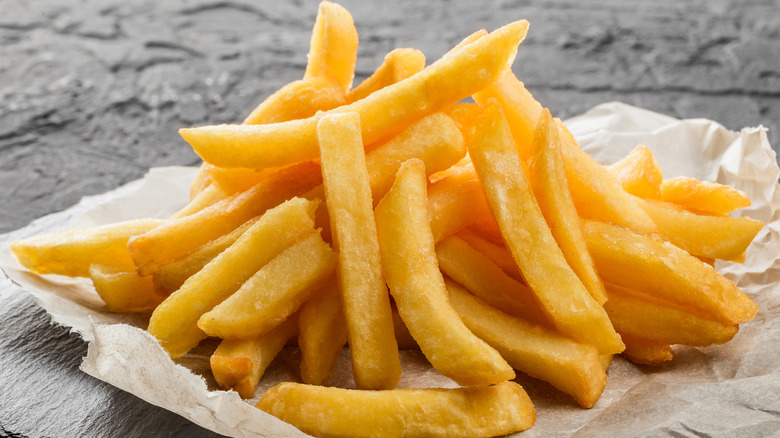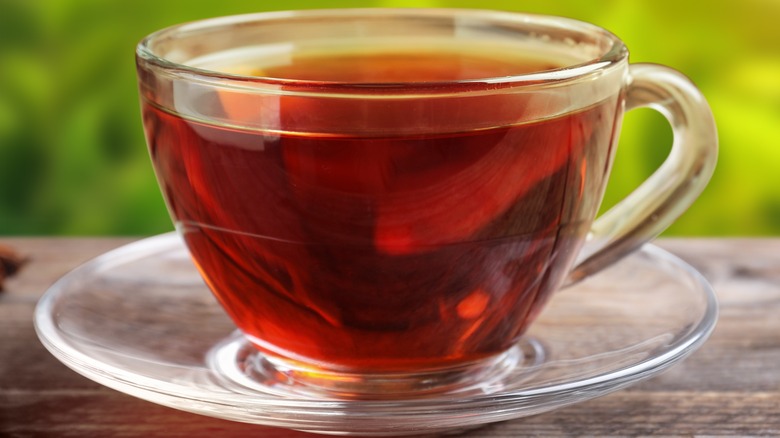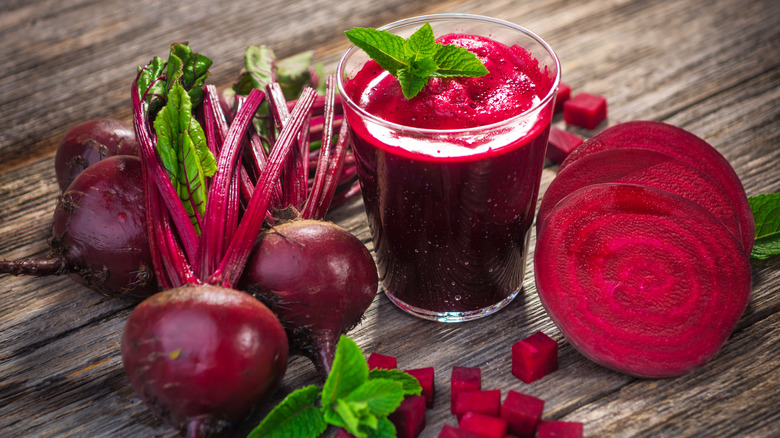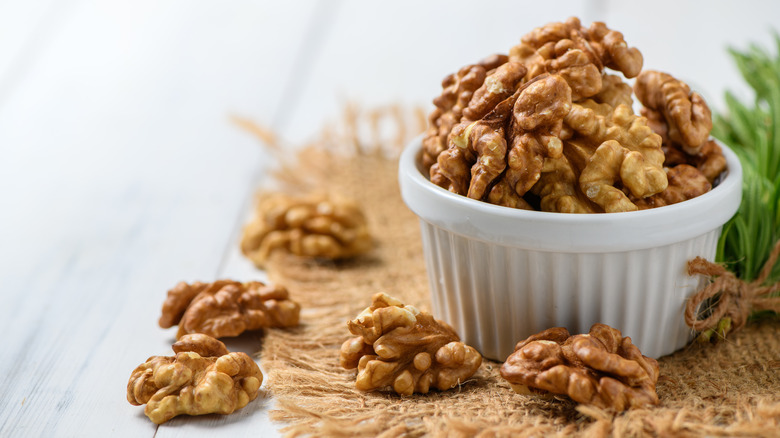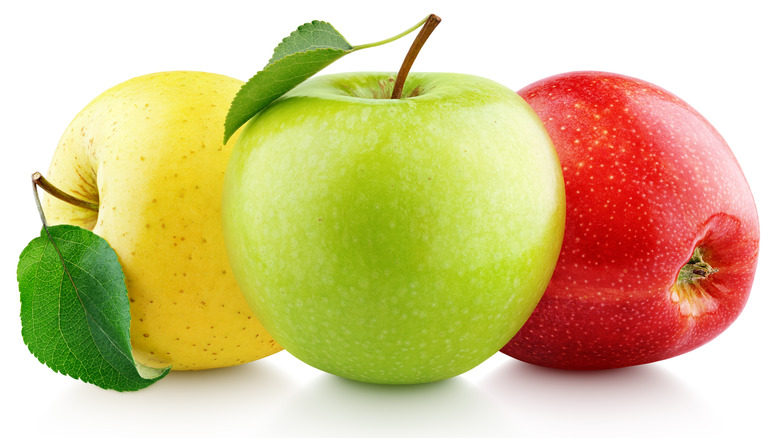14 Ways To Raise Your HDL Cholesterol
If you were playing a word association game and someone said "cholesterol," you may think of negative words like "dangerous" and "unhealthy." That being said, Medical News Today explains that we would have a hard time functioning if we didn't have some cholesterol. It helps with basic bodily tasks, like producing hormones. If that's the case, where do the "cholesterol is bad" concerns come from?
To understand that, we need to talk about lipoproteins. Cholesterol is a lipid (a.k.a. a fat), and your body forms particles from lipids and proteins called lipoproteins (via Medical News Today). By doing this, your body can transport cholesterol to areas that need it, or to the liver where it can eventually be removed. Because of this, you produce more than one type of lipoprotein: low-density lipoproteins (LDL) to bring cholesterol to different parts of your body, and high-density lipoproteins (HDL) to take excess amounts of cholesterol to the liver (via Medical News Today and the National Center for Biotechnology Information).
If you have high levels of LDL, your body can become oversaturated with cholesterol, which can eventually cause partially or fully blocked arteries (via MedlinePlus). This is why LDL is known as "bad" cholesterol. However, if your HDL is low, your body will have a harder time transporting cholesterol to the liver, which can also lead to problems with your arteries. Fortunately, there are simple lifestyle changes that can help increase your HDL levels.
Eating more monounsaturated fats
Despite fats in our diets getting a bad rap, some fats are actually good for you in the right portions. Case in point, monounsaturated fats have gained support for being a positive rather than a negative addition to our meals (via Verywell Health).
To be fair, there is still some debate and need for more research into the possible health benefits of monounsaturated fats (via Verywell Health). With that said, incorporating more foods with these types of fats into your diet could raise your HDL levels (via Verywell Health). In addition, monounsaturated fats can decrease your LDL (a.k.a. "bad" cholesterol), as well as your level of triglycerides, another type of lipid that in large amounts can damage your health (via Verywell Health and Medical News Today). In addition, monounsaturated fats' impact on LDL particles might reduce your chances of developing plaque in your arteries.
The good news is incorporating foods with monounsaturated fats into your diet is easy to do, especially if you like to cook. As Verywell Health points out, canola, sunflower, and olive oil are all great sources of this type of fat. Swapping out your usual cooking oil for any of these is an instant way to add more monounsaturated fats to your favorite recipes. Plus, it's also in peanut butter and avocados. However, you should still speak with your healthcare provider about the best monounsaturated fat-rich food for your individual health needs.
Working out regularly
Exercise is one of the most important ways you can raise your HDL levels. Not only does working out increase the amount of HDL in your system, but it also might make your high-density lipoproteins more effective.
As Medical News Today and the National Center for Biotechnology Information explain, HDL helps reduce inflammation while acting as antioxidants. When you exercise, you're more likely to generate more high-density lipoproteins and more powerful versions of them. Of course, you want to check with your healthcare provider before either starting a workout routine or ramping up an existing one. If they clear you for high-intensity forms of exercise, you might want to add them to your regular workout routine to potentially give you the biggest spike in HDL levels.
Aside from the overall positive effect exercise can have on your HDL levels, it also can impact the amount of high-density lipoproteins in your system because of its impact on your weight. According to Medical News Today, excess weight can cause HDL levels to decrease. In fact, research from one study found its participants saw their HDL levels rise considerably after following a "lifestyle modification program" that helped them lose weight (via Obesity Research & Clinical Practice and Medical News Today). Keep in mind that everyone who participated in this study fell into the categories of being overweight or obese.
Avoiding smoking
Let's be honest, quitting smoking can be very difficult. If you have any doubts, just think about all of the different products on the market designed to help a person give up smoking. As hard as it can be to quit, it can have a serious positive impact on your health.
According to the Office on Smoking and Health and the Centers for Disease Control and Prevention (CDC), smoking can decrease the number of HDL particles you have in your body. Remember, you need a certain amount of HDL to help your body rid itself of excess cholesterol (via Medical News Today). Otherwise, that cholesterol isn't properly cleared out of your tissues. This can lead to health problems, like plaque in your arteries. In fact, smoking has been shown to raise plaque levels in your circulatory system, as well as damage blood vessels, increase the number of triglycerides (another potentially harmful fat) in your body, and up your chances of developing blood clots. All of these health issues can increase your chances of experiencing a stroke and heart disease (via CDC).
In spite of all the possible health problems from smoking, quitting can feel impossible once someone becomes addicted to substances like nicotine. If you, or anyone you know, is struggling with addiction, help is available. Visit the Substance Abuse and Mental Health Services Administration (SAMHSA) website or contact SAMHSA's National Helpline at 1-800-662-HELP (4357).
Managing your stress
The saying "Stressed spelled backward is desserts" might be funny on a mug, but it should not be taken seriously, especially if you have low levels of HDL. Indulging in a favorite comfort food is very understandable during a stressful time. However, your body is already under enough strain without adding junk food and alcohol to the mix.
As WebMD explains, one of the ways your body responds to stress is by pumping out a hormone called cortisol. A little extra of this hormone every now and then is unlikely to be a major problem. Constantly high cortisol levels, on the other hand, spike your cholesterol (and, no, not the "good" kind). In fact, high stress and low HDL go hand-in-hand. Remember, you need HDL to move excess cholesterol to your liver, where your body can get rid of it (via Medical News Today). Plus, elevated LDL levels usually accompany elevated stress levels especially over a long period of time.
Keep in mind that these lower HDL and higher LDL levels happen in anyone who is often stressed, regardless of their diet (via WebMD). That being said, if someone responds to stress by overeating junk food, they're only increasing their odds of having cholesterol-related health problems. This is why stress management activities like meditation, exercise, and social activities are crucial. They can keep your HDL levels from dropping, helping you maintain your overall health.
The benefits of dark chocolate
You might be thinking, "Finally, a health list where it's okay to eat chocolate." However, there are a couple of important points to keep in mind. First, just because dark chocolate might help increase your HDL levels doesn't mean you should gorge on it (via Verywell Health). Moderation is the key to incorporating the right amount of this chocolate into your diet. Unfortunately, you can't swap out dark chocolate for milk chocolate (and certainly not white chocolate, which technically isn't chocolate at all).
The reason why dark chocolate can be effective at raising your HDL levels is because it contains more of the antioxidant, polyphenol, than milk chocolate (via Verywell Health and Diabetic Medicine). In fact, one study in the journal Diabetic Medicine found that participants who ate chocolate that contained large amounts cocoa and polyphenols saw a major jump in their HDL levels. However, the participants who consumed chocolate high in only cocoa didn't see their HDL levels improve.
Although cocoa might not help raise your HDL, it does contain compounds called flavonoids, which can support your heart's health (via Wiley Online Library and Verywell Health). And if you guessed that dark chocolate has a higher cocoa and flavonoid content than milk chocolate, you'd be 100% right. But one important tip: Chocolate processing methods can drop the final product's flavonoid levels, so do your homework when choosing the best dark chocolate brand for your health goals.
Adding chia seeds to your diet
For many people, the first thing that comes to mind when they hear the word "chia" is a certain "pet." Besides being a key ingredient in those pop culture-inspired planters, chia seeds can be very useful if you're HDL levels are dipping (via Healthline). However, there are some things to keep in mind before adding these seeds to your diet.
According to The Journal of Nutrition and Healthline, chia seeds can have an overall positive impact on your cholesterol since they not only can reduce your LDL levels, but also boost your HDL levels. This is because these tiny seeds are packed with omega-3 fatty acids. While we are still unraveling the beneficial impact that omega-3s have on our circulatory system, evidence suggests that they can help keep potentially dangerous plaque from developing in the arteries (via WebMD). Plaque can develop because of excess cholesterol, but HDL transports this cholesterol to the liver, where it can be processed and removed before it becomes plaque (via MedlinePlus).
Although adding chia seeds to your diet can be good for your HDL levels, you don't want to overdo it. As Healthline cautions, chia seeds are not only rich in omega-3s, but also fiber. The right amount of fiber in your diet can be beneficial for your overall health, but eating too much can lead to digestive issues (via the National Center for Biotechnology Information and Healthline).
The benefits of fish oil supplements
The human body is complicated. What will work for one person might not work for another. Case in point, fish oil supplements have a very mixed track record when it comes to managing cholesterol.
First, the good news: There is data that suggests fish oil supplements can increase your HDL levels (via Medical News Today and Nutrition, Metabolism & Cardiovascular Diseases). It also might have an impact on LDL, rendering them less likely to cause plaque buildup in your arteries. However, there is also some bad news: While fish oil may help keep the LDL in your system from causing health problems, it also might not lower (and could even increase) your LDL levels (via Pharmacy and Therapeutics and Medical News Today). In short, even though fish oil can help increase your HDL levels, the findings regarding fish oil supplements and cholesterol are inconsistent.
Because of the potential positive and negative impacts of fish oil on the LDL in your body, speak with your healthcare provider before taking any fish oil supplements. If you do decide to give fish oil a try, pharmacist and herbalist Dr. Simon Yeung recommends purchasing supplements that have been tested for quality and purity by either ConsumerLab.com or the U.S. Pharmacopoeial (USP) Convention Dietary Supplement Verification Program (via Memorial Sloan Kettering Cancer Center).
Avoiding excess sugar
Sometimes, a list with "good" and "bad" foods can have some overlap. For example, dark chocolate is a food that might help raise HDL levels (via Verywell Health). That being said, just because a little of this bitter-yet-sweet cocoa product might be beneficial doesn't mean you should ignore your sugar intake. This is especially the case if you have concerns about your cholesterol.
According to WebMD, consuming too much sugar makes you 3 times more likely to have low levels of high-density lipoproteins (HDL). In fact, one study found high sugar consumption and decreased HDL levels go hand-in-hand. In addition, a different study connected added sugar products to drops in high-density lipoproteins (via Everyday Health and Nature).
If you're not sure what counts as an added sugar product, ask yourself: 1) Has the food/beverage you're eating/drinking been changed through, for example, a manufacturing process, and 2) Has some form of sugar or caloric sweetener that doesn't naturally occur in this food/beverage's ingredients been added to the final product? If you answered "yes," to both of these questions, you're likely eating or drinking an added sugar product.
In addition to being potentially bad for your HDL levels, a 2010 study published in the Journal of the American Medical Association indicated that eating too much sugar can also spike your triglycerides (via WebMD). Remember, triglycerides are lipids or fats that can be harmful if you have too much of them (via WebMD and Medical News Today).
The benefits of berries
From adding them to yogurt and smoothies to just eating them after a workout, berries can be a great snack, a healthy dessert option, or a naturally sweet addition to a salad or meal. There is evidence that you can enjoy different berries in various ways and still have an overall positive effect on your HDL levels.
A 2008 study published in the American Journal of Clinical Nutrition found that consuming berries daily for 8 weeks boosted the participants' HDL levels. Keep in mind that the men and women participating in this study ate both whole and pureed berries, as well as drank berry juice. Plus, they were not given only one type of berry but an assortment, ranging from strawberries and raspberries to bilberries and chokeberries.
So, what do all these berries have in common that might have impacted the participants' HDL levels? One possibility is that berries are rich in polyphenols, which are a type of antioxidant (via WebMD). Regardless of the exact reason, if you or someone you know has concerns about cholesterol, you might want to speak with your healthcare provider about adding more berries to your diet. The study also found eating berries might help with blood pressure issues, but again, speak with your doctor before changing your diet. They may suggest specific berries that are good for your specific health needs.
Avoiding trans fats
Have you ever bought frozen food that listed "shortening" as one of its ingredients? How about a cooking oil that had the phrase "partially hydrogenated" on its label? If so, you've been consuming trans fat, even if the product claims to be "trans-fat free" (via Winchester Hospital).
Food companies that want to extend the shelf life of their products will sometimes add hydrogen to vegetable oils. By doing so, they change the oils from mainly unsaturated fats to trans fats. While monounsaturated fats might help raise your HDL levels, trans fats have the opposite effect (via Verywell Health and Winchester Hospital). In fact, trans fats are a double whammy when it comes to cholesterol because they decrease your levels of HDL while increasing the amount of LDL you have in your system.
To help safeguard your HDL levels, you might want to cut down on (or cut out entirely) certain foods, like frozen pizza, donuts, chips, French fries, and crackers (via Winchester Hospital). You also might want to remove margarine from your diet, and limit dairy and meat. If you're unsure about a product, check the trans fat line on its Nutritional Facts panel. Just keep in mind that, by law, manufacturers don't need to report the trans fat in foods if it is less than 0.5 grams per serving. Check the ingredients list if a product has an especially long shelf life.
Drinking rooibos tea
Rooibos tea, or red bush tea, is not rich in nutrients (via Healthline). It has fluoride and copper, but it's far from the most vitamin and mineral-packed choice in the tea aisle of your local supermarket. The secret to rooibos' success is it's a great source of antioxidants that might help increase your HDL levels.
A 2010 study published in the Journal of Ethnopharmacology found that its participants saw improvements in their HDL levels and a noteworthy decline in the amount of LDL in their systems after drinking rooibos for 6 weeks. Before you start brewing some red bush tea, however, there are two important things to keep in mind. First, the study's participants drank 6 cups of rooibos every day to get those results. Secondly, the impact on HDL and LDL levels only occurred in overweight adults.
Aside from possibly increasing HDL levels in certain individuals, research into rooibos suggests that it might be helpful for someone who needs to manage their blood pressure (via Healthline). In addition, the antioxidant in this tea may help regulate blood sugar levels and also prevent cancer. However, it's important to note that these last two possible health benefits are still in the early stages of testing and research.
The advantages of eating beets
While eating beets can potentially help with quite a few health problems, like a buildup of toxins in the body, beetroot juice might be just what your diet needs to give your HDL levels a boost (via Livestrong). Dr. Guy L. Mintz, director of cardiovascular health and lipidology at Sandra Atlas Bass Heart Hospital at North Shore University Hospital, told Livestrong that research has shown beetroot juice can increase your high-density lipoproteins.
HDL helps your body's cleanup crew when it comes to cholesterol. As Medical News Today explains, they transport excess cholesterol from your tissues to your liver, where it can begin the process of being removed from your body. Conversely, LDL does the opposite and transports cholesterol to the tissues throughout your body. Too little HDL and/or too much LDL can lead to unhealthy amounts of cholesterol in your system. Fortunately, as Dr. Mintz points out, beetroot juice can potentially lower LDL levels, giving you a potential one-two punch when it comes to managing cholesterol.
Although beets and beetroot juice might be good for your cholesterol, beets do contain sugar, so portion control is important (via Livestrong). One more quick note: Consuming beets can turn your urine either pink or red (via Livestrong and StatPearls).
The benefits of eating walnuts
Did you know that walnuts made the news in the fall of 2021? In October, Mashed reported that a red squirrel hid a whopping 42 gallons worth of these nuts in a man's truck. Now, in all likelihood, that squirrel was just getting ready for the winter and not looking to boost its HDL levels. However, research is finding evidence that walnuts (in the right portions, of course) might help with cholesterol management.
According to a 2004 study published in the journal Diabetes Care, walnuts can potentially raise HDL levels. In addition, this study concluded that consuming "a handful of walnuts" every day could lower LDL levels by 10%. However, it's important to keep in mind that the study's participants also stuck to a healthy meal plan to get these results. With that said, there is a reason why walnuts, in particular, might be so beneficial for cholesterol.
Unlike other members of the nut family, walnuts are packed with omega-3 fatty acids (via WebMD). Although we don't fully understand exactly how omega-3s and cholesterol are connected, it seems that eating walnuts does help reduce the number of triglycerides in your system. Remember, triglycerides are a type of fat that can be bad for your health if their levels get too high (via Medical News Today). In addition, walnuts are rich in antioxidants, which can help repair the damage from high LDL levels (via Healthline).
Adding apples to your diet
There was a time where grade school students would give their teacher an apple on the first day of classes. Even today, #1 teacher mugs, ornaments, and other keepsakes often feature a nice red apple as a callback to this tradition. Even if students no longer give their favorite teacher an apple, this doesn't mean the fruit isn't potentially great for your health, specifically for your cholesterol.
As U.S. News and World Report explains, apples are packed with fiber, which can be especially helpful if you need to boost your high-density lipoproteins (HDL). However, there is some important "fine print" when it comes to fiber and cholesterol. In particular, the type of fiber you eat can be crucial. As the Mayo Clinic explains, dietary fiber is usually divided into 2 categories: soluble and insoluble. The nature of soluble fiber, like the kind found in apples, means it helps boost HDL levels and also keeps your body from absorbing cholesterol that can eventually take a toll on your health (via U.S. News and World Report).
In addition to their potential impact on your HDL levels, apples are also rich in nutrients, like potassium and vitamin C, as well as antioxidants (via Medical News Today and the U.S. Department of Health and Human Services). Plus, potassium can be a good mineral to add to your diet if you have difficulty managing your blood pressure (via American Heart Association and Medical News Today).

